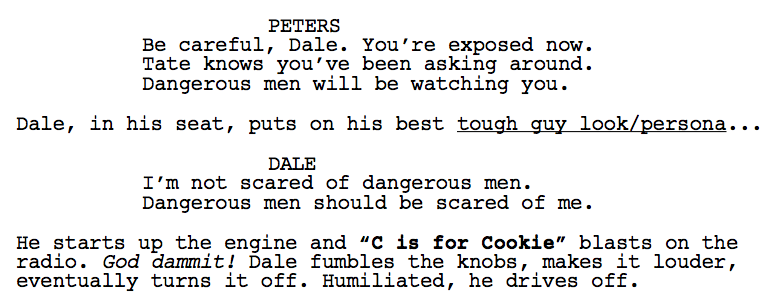Genre: Drama
Premise: (from Black List) Based on a true story, Dale Julin (a low-level Fresno affiliate morning show host) stumbles upon the biggest story of his life – and though he has reached the midpoint of his career without ever being a “real journalist” – risks his safety and his marriage to uncover the truth that a small Atomic bomb exploded in Central Valley California during the Korean War – a secret that had been hidden for decades.
About: I decided to go BACK to the Black List for today’s script. “Time and Temperature” finished on the low end of the list with 7 votes. The writer, Nick Santora, is a big deal in the TV world. He’s written for The Sopranos, Law & Order, Prison Break, and most recently created the CBS show, Scorpion. Santora did something I’ve claimed on this site is impossible. He won a screenplay contest (the New York International Film Festival Screenplay Contest) with his FIRST screenplay. Off that win, he was hired to write an episode of The Sopranos. Please don’t throw your laptops against the wall. Time and Temperature will be Santora’s directing debut. Ivan Reitman is producing the film.
Writer: Nick Santora
Details: 120 pages (5/31/13 draft)
On Monday we were talking about what makes an idea big enough to be a movie. In this day and age, unless you’re specifically aiming for the indie market and an Itunes release, you have to think big. And when I read the premise for this on the Black List, all I could think was, that doesn’t sound big enough to be a movie.
First of all, you have the word “small” in your logline. That’s not a good word to have in any logline. Movies are supposed to be big. The events that happen within them need to feel huge (unless you’re going for that indie market). Who cares about a “small atomic bomb?” It sounds insignificant in the grand scheme of things.
Tack onto that the Korean War. The Korean War?? The Korean War is like the forgotten stepchild of the Vietnam War. Nobody remembers the Korean War. Already this is looking bad. I mean, if you told me this was about a Japanese-American journalist in 1945 who found out that the U.S. was going to drop an atomic bomb on Hiroshima 2 days ahead of time and he had to decide whether to report about it or not… now you have yourselves a story. A mini-atomic bomb that didn’t even get dropped on anyone 60 years ago? Is that really a movie? I pray it is. Or else these are going to be a looooong 120 pages.
Time and Temperature is set in 1989 and focuses on local news show host Dale Julin. Dale’s specialty is doing those fluff-pieces like testing out the local Clown School. Which, in a way, is appropriate, since Dale’s career so far can be described as one giant pie in the face. He’s 44 years old, the age most people settle down into who they are. But Dale’s just not satisfied. He wants something more.
That opportunity presents itself when he takes his wife and two daughters to see his dad at the Travis Air Force base, where Dale grew up. His dad was a war hero, which is like adding flashing lights to Dale’s failures. While home, he learns that an old friend’s daughter just died of a rare form of cancer. But the kicker is that the man’s niece died from the same type of cancer two years ago.
His journalistic instincts kicking in, Dale starts asking around, and learns that dozens of people on the base have gotten cancer over the years. And it all came after a 1950 B-2 Bomber, which was headed to Korea to drop bombs, crashed on take-off. Dale gets the idea that this plane was carrying something with more kick than your average bomb, and he wants to prove it.
So he concocts a pretend reason to interview everyone on the base (a birthday bit for his dad) and just keeps digging. Like any good investigation story, there are some false leads, some interesting twists, and a lot of hardship, such as Dale losing touch with his family along the way. But he continues to hold onto the idea that it’s true, and that the government has been covering it up for 40 years.
It turns out there’s more to this story than just the bomb, and it’s something I wish they would’ve included in the logline (although that logline needs a meat cleaver chopping as it is). It’s not just the bomb that’s the issue. It’s that the bomb’s detonation has caused many people living on Travis Base to contract cancer.
In that sense, it’s kind of like Erin Brockovich, and it makes the story better because nobody gives a shit if a bomb blew up 60 years ago. But if people are still suffering NOW because of this? If it’s affecting the PRESENT? Now you have a story. And that’s something I wish Time and Temperature had hit on more. Because in the end, your story always has to deal with the now. Even the great The Girl With The Dragon Tattoo (the book), about a 50 year old missing girl case, ended its story here, in the now, with its main characters in trouble.
All in all, Time and Temperature was a strange read. The story doesn’t get started (Dale first finds out about the cancer) until page 38. Before that, I had no idea where it was going. All we needed were a few scenes to establish that Dale was unhappy and unappreciated at his job, and we could’ve headed off to the Air Force Base. Instead, we have way too many scenes at work covering the same thing and then him going up to a Giants game where an earthquake occurs (which he reports on). And while it was a good scene, it had me scratching my head. Why are we here? Where is this script going?
This is something we’re told over and over again but we writers are so freaking stubborn, we continue to ignore it. We fall in love with our scenes so much that we will add 5 pages of prep, 8 pages for the scene, and 5 pages of transition back to the original story JUST SO WE CAN GET THAT SCENE IN. That’s 18 pages you just wrote so you could get a single scene in. No wonder this script clocks in at 120 pages. Screenwriting is about eliminating anything that doesn’t keep the story moving forward. A trip to a Giants game moved this sideways.
But once we got to the actual investigation, the script picked up. And I started to understand Santora’s vision better. He was going for something different, a little quirkier than your average investigation story. For example, in one scene, when he’s rushing to interview a top Air Force general, Dale forgets his bag of clothes. Which is really bad because he’s still dressed in a Santa Clause suit from a just-finished news bit. I can already imagine the shot of that interview in the trailer.
Then there’s another scenario where he rendezvous with a mysterious figure in an abandoned parking lot. It’s very film noir. Unfortunately, it was Dale’s turn with the baby that day, so he’s actually wearing a baby bjorn, with a baby in it. “Is that a… baby bjorn?” the shadowy figures asks. The scene ends on the perfect note too, when the man, Peters, warns him about what’s coming…
The Black List loves this kind of stuff, where you’re riding the line between drama and humor. If you want to end up on the list, an unpredictable balance between these two will help.
Santora also does a good job with our hero, Dale. I think it’s always important to give your characters a “thing.” It doesn’t have to be a flaw, but there should be something specific that defines them. Dale is defined as “the person everyone forgets.” That point is hit on over and over again. And it’s the reason Dale’s so driven. He wants to be remembered for something. When you don’t define your characters with that specific trait, that’s when you’ll get the note from readers: “I never got a sense of that character.”
This just happened to me in a consult script I was reading. The main character was defined, but the three other family members were not, and it was very frustrating because despite each of them having a lot of screen time, I had to profess to the writer that I didn’t really know any of them.
Anyway, Time and Temperature was an up and down experience that was more good than bad. If Santora has some directing talent, he very well could turn this into a movie to watch for. It has just enough of a unique voice to distinguish it from all the other stuff out there.
[ ] what the hell did I just read?
[ ] wasn’t for me
[x] worth the read
[ ] impressive
[ ] genius
What I learned 1: Hurt other people with your hero’s actions, making it tougher for your hero to keep going. Dale’s Dad informs Dale that because of his snooping around the base, he’s about to be kicked out of his home. Now Dale’s decision to move forward is much tougher, as it’s not just hurting himself. It’s hurting someone he loves.
What I learned 2: Screen time does not define characters for an audience. You can’t just put a character in a movie for 70 minutes and assume that because they’re in it for so long, the audience will just “get” them. It’s up to you to clarify who your character is to the audience. Santora must’ve hit on the fact that Nick was a forgotten man a dozen times (when he walked into a library he was in the day before, the librarian couldn’t remember his face). So decide what that thing is that defines your character and then hit on it repeatedly through action and dialogue.



